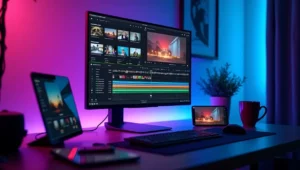How to Become a Computer Programmer Without a Degree
The demand for skilled computer programmers is skyrocketing. The good news? You don’t need a traditional college degree to become one. Many successful programmers have built their careers through self-learning, practical experience, and smart strategies. If you’re motivated, disciplined, and willing to put in the work, becoming a computer programmer without a degree is not just possible – it’s becoming increasingly common.
- How to Become a Computer Programmer Without a Degree
- 1. Understand What Programming Really Is
- 2. Pick the Right Programming Language to Start
- 3. Use Free and Affordable Learning Resources
- 4. Build Real Projects (Even Small Ones)
- 5. Practice Problem-Solving and Algorithms
- 6. Create a Portfolio That Shows What You Can Do
- 7. Contribute to Open Source Projects
- 8. Network with Other Programmers
- 9. Create a Resume and LinkedIn Profile That Highlights Skills
- 10. Apply for Jobs, Freelance Gigs, and Internships
- 11. Keep Learning and Stay Updated
- Final Thoughts
1. Understand What Programming Really Is
Before diving into code, understand what a computer programmer actually does. Programmers write, test, and maintain code that powers software applications, websites, and systems. You’ll need to understand logic, problem-solving, and how to communicate with computers using programming languages like Python, JavaScript, or Java.
Start by exploring:
- How software works
- The role of algorithms and data structures
- Different types of development (web, mobile, backend, game, etc.)
2. Pick the Right Programming Language to Start
Choosing the right language depends on your goals. Here’s a quick guide:
- Web Development: Start with HTML, CSS, and JavaScript
- Mobile Apps: Learn Java (for Android) or Swift (for iOS)
- Data Science & AI: Python is your best friend
- Game Development: C# with Unity or C++ for Unreal Engine
- Backend Development: JavaScript (Node.js), Python, Ruby, or PHP
Start with one language and go deep before branching out.
3. Use Free and Affordable Learning Resources
You don’t need to pay thousands of dollars to learn programming. There are plenty of platforms and resources that offer high-quality content for free or at a low cost.
Some top platforms include:
- freeCodeCamp: Hands-on coding challenges and certifications
- Coursera: Offers programming courses from top universities
- edX: Learn computer science basics from MIT or Harvard
- YouTube: Channels like Traversy Media, The Net Ninja, and Programming with Mosh
- CS50 (Harvard’s Intro to Computer Science): A free, in-depth introduction
Keep a daily schedule and follow a structured roadmap to stay on track.
4. Build Real Projects (Even Small Ones)
Theory is important, but practical experience is what truly counts. Build real-world projects – even small ones.
Examples:
- A personal website or portfolio
- A to-do list app
- A weather checker using APIs
- A simple game (like Snake or Tic-Tac-Toe)
- A blog CMS using backend and frontend tools
Real projects help you:
- Learn faster by doing
- Solve real problems
- Build a portfolio that attracts recruiters and clients
5. Practice Problem-Solving and Algorithms
Programmers are problem-solvers. To stand out, focus on improving your logical thinking and algorithmic skills.
Platforms to practice coding challenges:
- LeetCode
- HackerRank
- Codewars
- CodeSignal
Solving these problems sharpens your thinking, prepares you for technical interviews, and gives you confidence.
6. Create a Portfolio That Shows What You Can Do
Without a degree, your portfolio becomes your resume. A strong portfolio includes:
- Links to live projects
- Code repositories (on GitHub or GitLab)
- Screenshots and short descriptions of your projects
- Case studies explaining your design and coding decisions
Make sure it’s hosted online, easy to navigate, and showcases your best work.
7. Contribute to Open Source Projects
Contributing to open-source is a powerful way to:
- Gain real-world experience
- Collaborate with other developers
- Learn to work with codebases created by others
- Build a strong resume
You can find beginner-friendly projects on GitHub using labels like “good first issue.” Even fixing small bugs or writing documentation is valuable.
8. Network with Other Programmers
Community matters. Surrounding yourself with like-minded people will accelerate your growth and open up opportunities.
Ways to connect:
- Join programming communities on Reddit, Discord, and Stack Overflow
- Follow programmers on Twitter and LinkedIn
- Attend virtual meetups or coding events
- Participate in hackathons or coding contests
Networking can lead to job referrals, mentorship, and valuable feedback.
9. Create a Resume and LinkedIn Profile That Highlights Skills
When applying for jobs, don’t let the absence of a degree hold you back. Focus on:
- Your technical skills (languages, frameworks, tools)
- Completed projects
- GitHub profile and portfolio website
- Soft skills like problem-solving, communication, and teamwork
Optimize your LinkedIn profile with relevant keywords like “self-taught programmer,” “JavaScript developer,” or “Python backend developer” to appear in recruiter searches.
10. Apply for Jobs, Freelance Gigs, and Internships
Start small. Don’t wait for a perfect opportunity—build experience through:
- Freelancing platforms (Upwork, Fiverr, Freelancer)
- Entry-level or internship roles (remote or local)
- Volunteer work for NGOs or small businesses
- Personal outreach to startups
Focus on building credibility and a track record. Once you have real-world experience, it’s easier to land better roles.
11. Keep Learning and Stay Updated
Technology moves fast. A self-taught programmer must stay curious and up-to-date.
- Read tech blogs and documentation
- Follow news on Hacker News, Dev.to, and Medium
- Learn about new frameworks, tools, and trends
- Experiment with side projects to explore new ideas
Consistency is key. A little progress every day compounds into big success.
Final Thoughts
You don’t need a computer science degree to become a programmer. With dedication, smart learning, and hands-on practice, you can build a rewarding programming career on your own terms. Focus on building real projects, showcasing your work, and always learning. In the world of programming, what you can do matters far more than what degree you have.
Start today. Write your first line of code. Your future as a programmer is just one step away.




